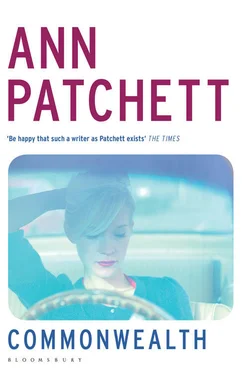The guests were catching on to the fact that Beverly’s daughter had arrived, and the ones who knew her were anxious to see her, and the ones who didn’t know her had heard so much about her. Matthew leaned towards her, whispered in her ear, “Run.”
Franny gave her mother a kiss. “I’ll be right back,” she said.
She went through the kitchen, where two black men in black pants with white shirts and vests and ties piled ham biscuits onto silver trays, while a third man arranged boiled shrimp around a cut-glass bowl of cocktail sauce on a massive silver platter. They didn’t lift their heads from their work when she came through the room. If they saw her at all they said nothing about it. She went up the back stairs to the room where she and Kumar always slept. All of the Dine boys lived in town, all in beautiful houses of their own, so even at Christmas there was never a worry about space. In his retirement Jack Dine’s empire had been divided three ways, giving Matthew the Toyotas, Pete the Subarus, and Rick the Volkswagens. Rick, who was lazy, was also bitter, and often said it wasn’t fair that Matthew got Toyota. No one could compete with Toyota. He particularly envied his brother the Prius.
Franny opened the door quietly and found her husband lying on top of the bedspread in the dark. His jacket and tie were hanging in the closet, his shoes tucked beneath the bed. Kumar had always been neat, even when they were in law school. She dropped her coat and scarf on the floor, pushed out of her snow boots.
“I would feel very sorry for myself,” he said quietly, his hands folded over his stomach, his eyes closed, “except that I’m feeling sorry for you.”
“Thank you,” she said and crawled the length of the vast mattress to lie beside him.
He put his arm around her, kissed her hair. “A different couple would make love now.”
Franny laughed, pushing her face into his shoulder. “A couple whose children wouldn’t be walking in the room any minute.”
“A couple whose host wouldn’t shoot the son-in-law for miscegenation.”
“I’m sorry about that,” Franny said.
“Your poor mother. I have to feel sorry for your mother, too.”
Franny sighed. “I know.”
“You have to go to the party,” he said. “I’m not brave enough to go back down there with you, but you have to go.”
“I know,” she said.
“Ask the boys to bring me up a plate, will you?”
Franny closed her eyes and nodded against his chest.
If Kumar had his way they would leave for Fiji every year just before Thanksgiving and not return until the New Year rang in and the decorations came down. They would swim with the fishes and lie on the beach eating papaya. On the years they were tired of Fiji they would go to Bali or Sydney or any sunny, sandy place whose name contained an equal number of consonants and vowels.
“What about school?” Franny would ask.
“Aren’t we capable of home-schooling for six weeks out of the year? It wouldn’t even be a full six weeks. We would subtract the weekends and vacation days.”
“What about work?”
Kumar would look at her sharply then, his dark eyebrows pushing down. “Just participate in the fantasy,” he said.
Kumar’s first wife, Sapna, had died on Pearl Harbor Day in the full tilt of the holiday season, four days after Amit was born. It was easy enough to remember how long ago that was as Amit was twelve. Sapna had been ten years younger than Kumar.
“Ten years kinder,” he would say to her on her birthday. “Ten years more forgiving.” It was true, Sapna’s joy in life could make her seem uncomplicated, when in fact she was probably as complicated as anyone else. “No stupidity in happiness,” she liked to say. She loved her husband, she loved her sons. She loved that she had managed to escape northern Michigan for Chicago. Their lives, however busy and freezing cold, were good lives. She had come through childbirth for a second time without a hitch. They were all home together. Ravi, who was two and a half, was taking a nap. Sapna was sitting on the couch, the baby in her arms. She looked right at Kumar and said, “It’s the strangest thing.” Then she closed her eyes.
The autopsy showed a genetic abnormality of the heart — long QT. Considering the severity of her condition, the real surprise was that she hadn’t died after Ravi was born. But sometimes people didn’t. Sometimes they lived their entire lives never knowing the fate they missed. When tested, they found out Sapna’s mother had the gene as well. Her sister had it.
“For the vast majority of the people on this planet,” Fix had said, “the thing that’s going to kill them is already on the inside.”
It was less than a year after the death of his wife that Franny came to Kumar’s table at the Palmer House and asked him what he wanted to drink.
“Jesus,” he said, staring up at her in disbelief. “Tell me that you’re not still working here.”
Kumar, she thought. How had she forgotten Kumar? “Every now and then, only on the weekends,” Franny said, leaning over to kiss his cheek. “I have a real job in the law library back at the University of Chicago but the pay is appalling. Plus I like it here.”
Kumar was waiting to pick up a client and take him to dinner. “I’m offering you a job,” he said. “You can start Monday. A single job that will pay you more than your two jobs combined.”
Franny laughed. Kumar hadn’t changed. “Doing what?”
“Due diligence.” He was making it up. “I need you to compile financial records for a merger.”
“I never finished law school.”
“I know how far you got in law school. We need someone we can count on. This is your interview. There, I’ve hired you.”
A tall black man in a charcoal suit came to the table and Kumar stood to greet him. “Our new associate,” Kumar said to the man, holding out his hand towards Franny. “Franny Keating. Is it still Keating?”
“Franny Keating,” she said, and shook the man’s hand.
Later, Kumar would say he worked it out on the spot: he would marry Franny, and in doing so solve everything except the unsolvable. He had loved her when they were young — if not in the year she had shared his apartment then at least after she had left with Leo Posen. If she were free he saw no reason he wouldn’t be able to love her again. The problem was time. Sapna’s parents had come from Michigan to take care of Ravi when Amit was born and almost a year later they were still living in his house. Between work and his children, between his life and the enormous burden of grief, there wasn’t a minute in any day that wasn’t devoured. His genius would be to hire Franny rather than date her. He didn’t want to date her anyway. He wanted to marry her. If she came to work in his law firm they would see each other every day. They would come upon each other’s stories naturally, in the elevator or exchanging files. He could make sure that his idea was as good as he thought it was before entrusting her with his children and his life.
Settled, he thought when he handed her his business card and said goodnight, everything’s settled.
The bar was still playing the same tape all these years later, or a tape that was remarkably similar to that other tape. Franny would have laughed to think how much it used to bother her. She never heard it anymore. But when Kumar and his client left the bar and she put his business card into her apron pocket, she could half-hear Ella Fitzgerald singing as if in the back of her mind,
There’s someone I’m trying so hard to forget
Don’t you want to forget someone too?
Lying in the darkness of her mother’s house, Franny tried to imagine a world in which Sapna had lived. Maybe Franny and Kumar would have met again, bumped into each other in a bookstore one day, laughed and said hello and gone on, but she never would have married him, and his sons would never have been her sons. If Sapna could have lived then certainly Beverly could have stayed married to Fix, which would mean no Jack Dine, no Dine stepbrothers, no Christmas party in Virginia. It would also mean no Marjorie though, and that would be a terrible loss when Marjorie had given Fix the benefit of great love. But maybe Bert would have stayed with Teresa then, and fifty years later he might have saved her life by insisting she go to the doctor in time. Cal would have missed the bee that was waiting for him in the tall grass near the barn at Bert’s parents’ house. He could have lived for years, though who’s to say another bee wouldn’t have found him somewhere else? With Cal alive, Albie would never have set the fire that brought him to Virginia, though he wouldn’t have come to Virginia anyway because Bert would have stayed in California. Franny, half asleep on top of the bedspread beside her husband, was unable to map out all the ways the future would unravel without the moorings of the past. Without Bert, Franny would never have gone to law school. She would have gotten a masters in English and so she never would have met Kumar at all. She never would have been in Chicago working at the Palmer House and so she never would have met Leo Posen, who sat at the bar so many lifetimes ago and talked about her shoes. That was the place where Franny’s life began, leaning over to light his cigarette. Somehow, out of all that could have been gained or lost, the thought of having never met Leo was the one thing she couldn’t bear.
Читать дальше
